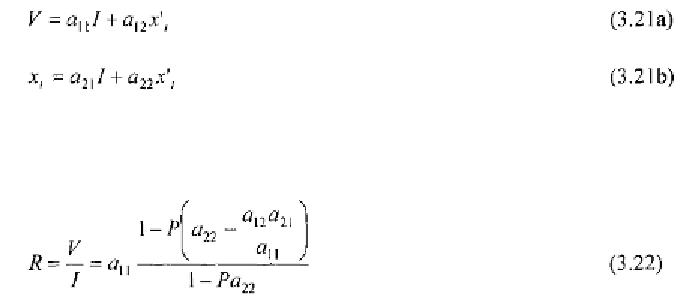Environmental Engineering Reference
In-Depth Information
3.5 THE BLACKMAN THEOREM
Feedback not only modifies the closed-loop network transfer function,
but also determines a change in the input/output resistances (impedances).
Specifically, as demonstrated in many classical textbooks such as [MG91],
the input resistance increases (decreases) by a factor 1+
T
when the signal
mixed at the input is a voltage (current). In contrast, the output resistance
increases (decreases) by a factor 1
+T
when the sensed signal is a current
(voltage). This conforms to the well-known rule that a series (shunt)
feedback connection in either the input or output increases (decreases) the
associated port resistance. However, in practical circuits there is not often a
sharp separation between the above mentioned cases. In other words, there
are situations that do not match either of the canonical configurations, and
hence a more general technique is needed to derive resistance relations.
Input and output resistances can be efficiently evaluated by using the
Blackman theorem [B43]. It was introduced in 1943 and rediscovered by
Rosenstark [74] and Grabel [MG91], and was also independently developed
through signal flow analysis by Choma [C90].
The signal flow scheme in Fig. 3.2 and related equations (3.3) and (3.4)
are general and, hence, can be used to represent the relation between the
voltage and the current at the input or the output port. Let variables and
be the voltage and the current of the considered port respectively. Eqs. (3.3)
and (3.4) can be rewritten as
Following the same procedure which leads to the Choma representation
we get
To interpret this result observe that term is the ratio between
V
and
I
,
when the controlled variable is zero. In other words, this means that term
is the resistance level without feedback (i.e.,
P =
0). Term is the loop
gain, which is computed by setting variable and, hence,
I
equal to zero.
This means evaluating the loop gain with the considered port unloaded.
Finally, as derived in the Choma approach, term
is the








